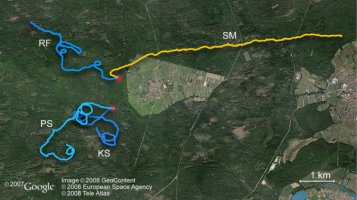Just read an interesting article...
Interesting article
'Walking in circles'

'Did you know that people who are blindfolded will tend to walk in circles?
No one completely understands why human beings do this. If someone is blindfolded or disoriented or even lost in unfamiliar territory, they will often veer off course in random circles, even when they think they are walking in a straight line.
Some have supposed that the phenomenon of walking in circles has something to do with being right-handed or left-handed, or perhaps something to do with having stronger or longer legs on one side or the other. But neither of these explanations has held up to scientific study.
One of the more interesting studies was conducted recently by Jan Souman of the Max Planck Institute for Biological Cybernetics.
They studied people walking in desert and forest environments. Some of the walkers were blindfolded and some were not. All were told to walk in a straight line as far as they could. The participants in the study walked for hours as their paths were recorded by GPS monitors.
Those who walked blindfolded ended up walking in surprisingly small circles. For those walkers who were not blindfolded, an interesting discovery emerged:

When the sky was cloudy and the walkers could not see the sun by day or the moon by night, the walkers could not keep a straight line. They veered off course in random directions, crossed their own paths, and walked in circles.
 But when the sky was clear and the sun or moon were visible, the walkers could keep a long straight line for many hours through trackless deserts and vast forests.
But when the sky was clear and the sun or moon were visible, the walkers could keep a long straight line for many hours through trackless deserts and vast forests.
This seems to show that when we cannot keep an external reference point, something inside us makes us walk in random circles.'

 www.newscientist.com
www.newscientist.com
Interesting article
'Walking in circles'

'Did you know that people who are blindfolded will tend to walk in circles?
No one completely understands why human beings do this. If someone is blindfolded or disoriented or even lost in unfamiliar territory, they will often veer off course in random circles, even when they think they are walking in a straight line.
Some have supposed that the phenomenon of walking in circles has something to do with being right-handed or left-handed, or perhaps something to do with having stronger or longer legs on one side or the other. But neither of these explanations has held up to scientific study.
One of the more interesting studies was conducted recently by Jan Souman of the Max Planck Institute for Biological Cybernetics.
They studied people walking in desert and forest environments. Some of the walkers were blindfolded and some were not. All were told to walk in a straight line as far as they could. The participants in the study walked for hours as their paths were recorded by GPS monitors.
Those who walked blindfolded ended up walking in surprisingly small circles. For those walkers who were not blindfolded, an interesting discovery emerged:

When the sky was cloudy and the walkers could not see the sun by day or the moon by night, the walkers could not keep a straight line. They veered off course in random directions, crossed their own paths, and walked in circles.
 But when the sky was clear and the sun or moon were visible, the walkers could keep a long straight line for many hours through trackless deserts and vast forests.
But when the sky was clear and the sun or moon were visible, the walkers could keep a long straight line for many hours through trackless deserts and vast forests.This seems to show that when we cannot keep an external reference point, something inside us makes us walk in random circles.'

We can't help walking in circles
Without landmarks or the sun to guide them, people really do veer off in one direction – but it's not because one leg is longer than the other
Last edited:


 ..
..